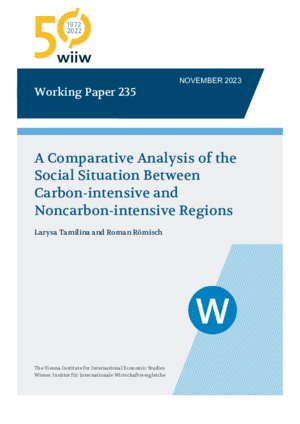A Comparative Analysis of the Social Situation Between Carbon-intensive and Noncarbon-intensive Regions
Roman Römisch and Larysa Tamilina
wiiw Working Paper No. 235, November 2023
53 pages including 6 Tables and 11 Figures
This study focuses on the social situation in carbon-intensive regions and the role of migration in defining its quality. The analysis examines whether carbon-intensive areas, especially those with large outward migration, are more vulnerable to adverse social trends than other regions. Our findings reveal a robust association between the processes of decarbonisation and migration, which collectively exert a significant impact on the social conditions within EU regions. This influence is assessed using various indicators, such as the Social Progress Index, employment rates, availability of hospital beds, access to preschool education, and the prevalence of severe material deprivation. We demonstrate that compared to noncarbon-intensive regions, carbon-intensive regions, compelled as they are to undergo structural changes to meet environmental requirements, have a diminished capacity to offer their residents satisfactory employment opportunities and a high quality of social life. Moreover, if carbon-intensive regions experience the challenge of negative net migration, their social development is highly likely to face a notable deterioration. On the other hand, in cases where inward migration predominates, regions at risk of decarbonisation tend to exhibit minor deterioration – and even outperform the noncarbon-intensive group experiencing outward migration.
Keywords: decarbonisation, migration, social situation, EU-SPI, EU regions
JEL classification: Q01, R23, I31
Countries covered: European Union
Research Areas: Regional Development
